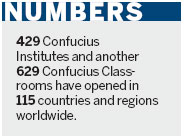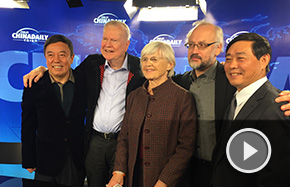Hanban shops around for a wider choice
 |
|
Photos provided to China Daily |
Before joining Hanban as its first director-general, Xu ran the New York Service Center for Chinese Study Fellows for two years and spent another four years in Vancouver as the Chinese counsellor of education.
"For many years, the outside world focused on our efforts to open up our markets and acknowledged our economic growth. But they didn't think much about our education and scientific research, which have also become open and transparent," said Xu, who started working in the Ministry of Education in 1981.
To build stronger mutual trust and seek localization, each Confucius Institute is established and managed by a local college and a Chinese counterpart.
And Hanban's philosophy is not "the faster, the better". Usually, it sends a teacher to the applicant college to see whether there really is a huge demand for learning Chinese and conducts a thorough survey before establishing an institute.
Currently, the United States is leading with 96 Confucius Institutes - four more than the total number of the second to sixth hosts - Britain (24), South Korea (19), Russia (18), France (17) and Germany (14).
"Another 70 colleges (in the US) are still waiting in line," Xu said.
The development, however, has not been without challenges. "At first, we were even suspected of being an intelligence agency," she said.
The tension was highlighted when the US government signed a controversial visa policy in May last year that would force 51 out of 600 Chinese teachers at 81 Confucius Institutes at the time to leave the US in six weeks.
The US Department of State, however, changed the policy after receiving letters from dozens of university presidents who were against the move.
"The driving force is the students and the communities that the colleges serve," Xu said. "They want to learn Chinese and Chinese culture, especially the businesspeople in small and medium-sized enterprises that trade with China.
"The colleges have to respond to the community and the government has to respect the colleges."
Related:
























